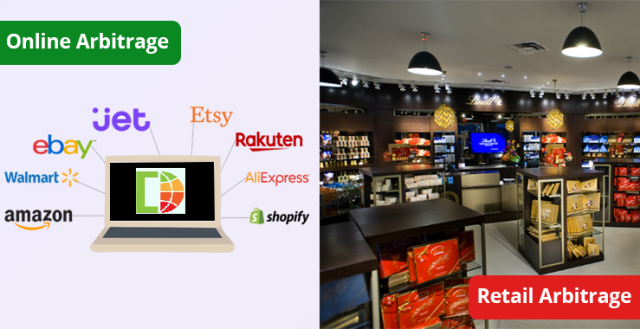Online Arbitrage vs Retail Arbitrage on Amazon
Online retail arbitrage is a special form of reselling procedure whereby the reseller checks the sale price of the products before purchase and deals with an endless number of Amazon FBA suppliers rather than a couple of suppliers. The product is typically charged upfront in cash, the reseller is not allowed to place minimum orders, and resale generally takes place within hours or days, rather than months, from the time of purchase.
There are two types of arbitrage business. One is a traditional form called retail arbitrage, and another is online arbitrage, an increasingly popular and trending form. When considering arbitrage business on Amazon, you should be mindful of the slight variations and similarities.
Retail Arbitrage
What is Retail Arbitrage?
Retail arbitrage is a simple concept in which a retail outlet (such as Walmart, Target, etc.) sells a product for a given price (online or in-store). You buy this product, sell it yourself, and save the income for a better price. The source for retail arbitrage is a brick-and-mortar shop, such as a retail chain, an outlet store, or even a next-door neighbor having a yard sale.
Retail arbitrage has dual benefits: the seller doesn’t have to keep his inventory and can utilize existing stock, which might be available at a nearby store. Retail arbitrage people visit nearby stores, find discounted goods, scan those goods, compare them with items listed on Amazon FBA, and profit from price variation.
Retail arbitration is an uncertain issue. Over the last few years, even people in it have struggled to find the right goods at the right price. Those who leave their day job to become full-time arbitrators in retail frequently experience the same consequences. This complexity also leads many to follow another form of arbitrage business — Online arbitrage.
Get your Amazon store launched quickly and successfully. With our Amazon Account Management Services in USA, you can easily set up an account and start selling on Amazon.
Online Arbitrage
What is Online Arbitrage?
Online Arbitrage (OA) is a simple way to make money. It is purchasing products from online retailers (like Walmart or Target) and then selling them for a profit from another marketplace such as (Amazon or eBay).
Only you have to purchase cheap (less cost) goods from an online store to sell at a good profit.
Instead of depending on shoppers walking into your store, you can instantly sell your products to people across the globe. You can source your products online and then sell them at different prices to buyers in various countries.
The downside of purchasing items in brick-and-mortar stores is that you have to deal with higher wage costs (which, in effect, increase the product prices). Still, you can find some pretty good discounts (i.e., yard sales, clearance sales) and inspect items in detail rather than randomly shopping.
You can make some good money if you’re working with Amazon online arbitrage and selling online. You can source products from online platforms like Alibaba, where you can buy products in bulk at very cheap prices, particularly when you can turn around and re-sell those products at a good profit.
Quick comparison chart (Online Arbitrage vs Retail Arbitrage)
| Retail Arbitrage | Online Arbitrage | |
| Investment Cost | Low-medium | Low |
| Labeling | NA | NA |
| Listing Details | Import | Import |
| Product Marketing | NA | NA |
| Scalability | Low | Low |
| Profitability | Low | Medium-High |
| Overheads | Medium | Very Low |
| Automation | Limited | Yes |
Retail Arbitrage Vs Online Arbitrage – Which Is Best For Amazon FBA?
Online arbitrage has become a new and popular way to start an Amazon FBA business. It is progressively overtaking retail arbitrage, as many Amazon FBA sellers plan to work and operate as a business model online. It enables people from anywhere worldwide to operate an Online Arbitrage business.
Which business form is much better? Online Arbitrage or Retail Arbitrage?
Finding whether retail or online arbitrage is better seems like an endless conversation. You also might be having own personal opinion as to which one will be more beneficial for you. Yet online arbitrage seems to be the leading business form, according to most online sellers, as more people are interested in it.
Online and Retail Arbitrage Differences
The source for retail arbitrage is a brick-and-mortar shop, like a supermarket chain, an outlet store, or even a neighbor with a yard sale. The dealer finds a product and manages shipping and warehousing for it. On the other hand, the online arbitrage source has an online presence, meaning resellers can schedule their purchase and selling to reduce logistics costs.
Similarities Between Online and Retail Arbitrage
Arbitragers produce more revenue for source retailers, often buying in bulk, during liquidation, revenue, or when sales occur. But while they temporarily raise demand on the source market for a product, when they need it, they just buy what they need. These often increase the supply of the target market of such goods, but these appear to trigger unexpected price swings that affect competitors as these sell quickly and cheaply.
Conclusion
Today, we have seen a quick comparison between Online Arbitrage & Online Arbitrage, also the benefits and drawbacks of both business models.
It can certainly be beneficial if you have the time and courage to go around local stores and search for FBA deals. Still, the trend leads to Online Arbitrage becoming the standard FBA start-up business model because it is much easier and less time-consuming than Retail Arbitrage. Online Arbitrage is a perfect way to add a side income to your full-time work.

